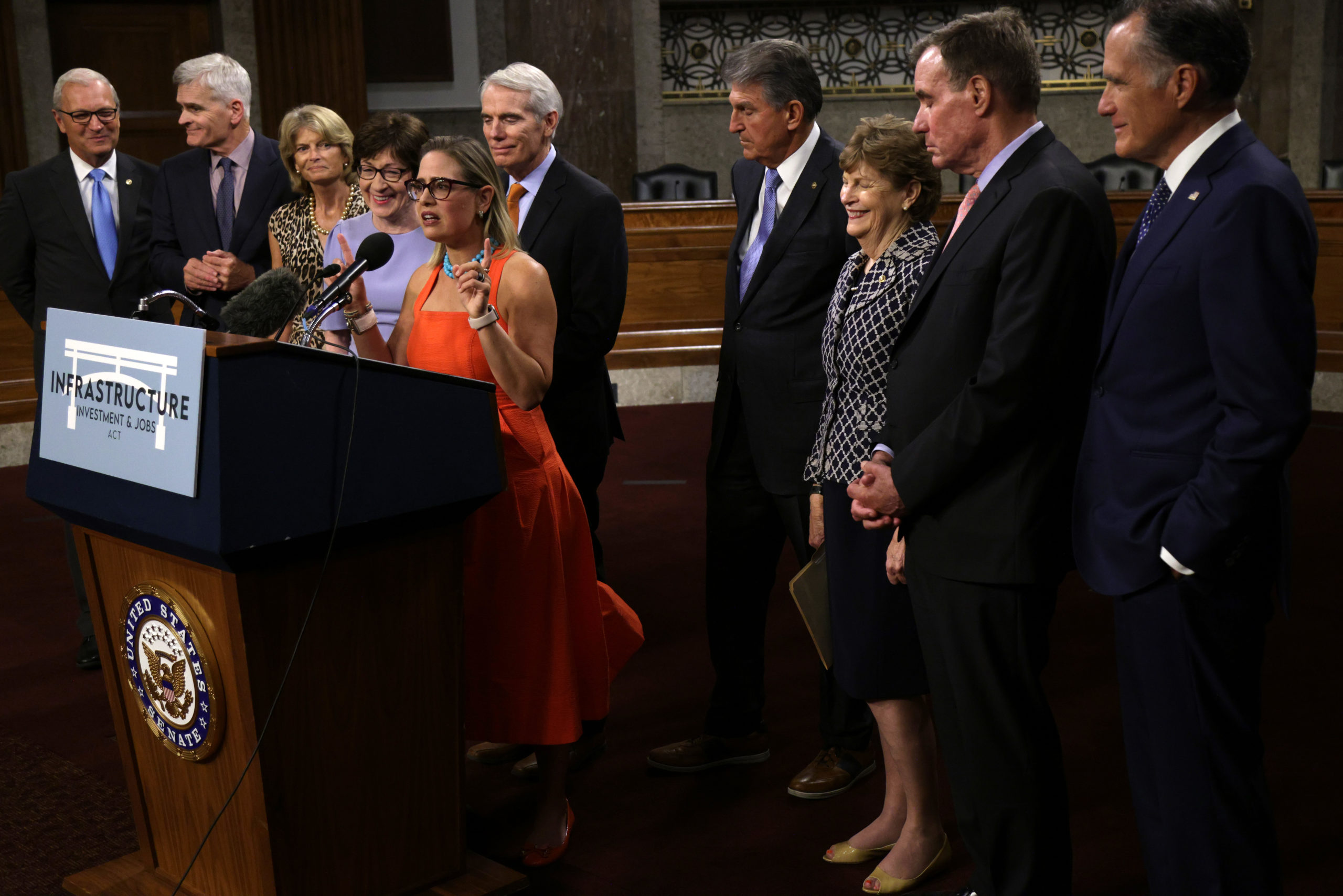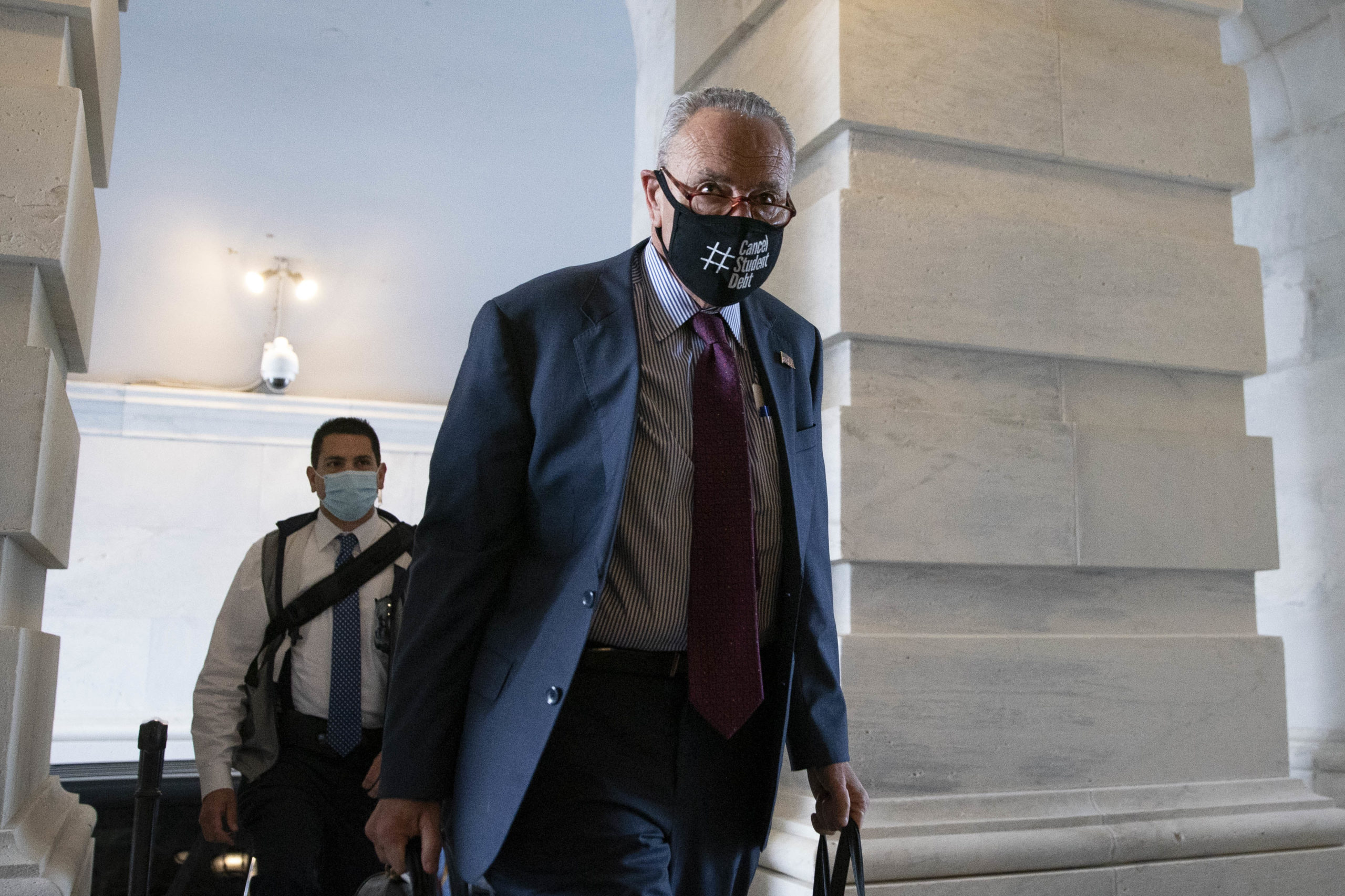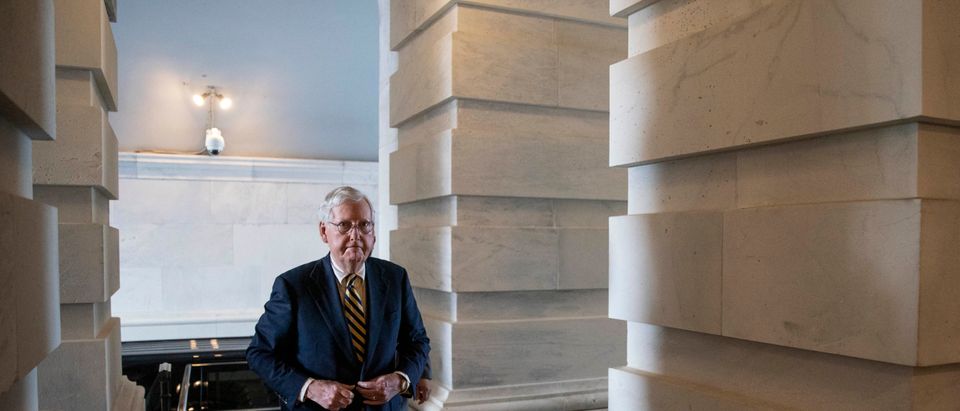- The bipartisan infrastructure bill overcame a Senate filibuster again Sunday, putting the sweeping public works package on a glide path to final passage after months of delicate negotiations.
- The bill, which would be the largest investment in roads, bridges, ports, broadband and more in decades, advanced with significant bipartisan support, with moderate senators in both parties lauding it as a critical move for the future of the country.
- “I am quite confident that out of 100 United States senators, there are 100 of us who believe the bill is imperfect,” said Senate Majority Leader Mitch McConnell. “The American people need roads, bridges, ports, and airports to build their businesses, build their families, and build their lives. Republicans and Democrats have radically different visions these days, but both those visions include physical infrastructure that works for all of our citizens.”
The bipartisan infrastructure bill overcame a Senate filibuster again Sunday, putting the sweeping public works package on a glide path to final passage after months of delicate negotiations.
The bill, which would be the largest investment in roads, bridges, ports, broadband and more in decades, advanced with significant bipartisan support, with moderate senators in both parties lauding it as a critical investment in the future of the country.
The vote, which was to invoke cloture on the bill as a substitute amendment, was approved 68-29, with 18 Republicans joining every Democrat in voting in favor. It followed an earlier procedural vote, which passed 64-33, and a motion to adopt the amendment, which passed 69-28.
The vote sets the package up to officially pass the Senate Tuesday.
The bill, titled the Infrastructure Investment and Jobs Act, would cost $1.2 trillion over eight years, $550 billion of which is new government spending. It was led by Ohio Republican Sen. Rob Portman and Arizona Democratic Sen. Kyrsten Sinema, and was the result of negotiations among 22 senators and President Joe Biden.
Talks first began with West Virginia Republican Sen. Shelley Moore Capito, but collapsed after she and the White House could not agree on the overall size and scope of the bill. Negotiations appeared to be in serious jeopardy last month before Portman announced July 28 that the group had reached agreement on the “major issues,” and Republicans were ready to move forward. (RELATED: Senators Officially Introduce Infrastructure Bill, Hope For Final Passage In Days)

Sen. Kyrsten Sinema speaks alongside her fellow senators involved in infrastructure negotiations on July 28, after the Senate first advanced the bill. (Alex Wong/Getty Images)
The bill cleared its first procedural vote hours later with 17 Republicans, including Senate Majority Leader Mitch McConnell, voting to proceed. On July 30, 16 Republicans joined Democrats in officially voting to begin debate, even though the official text of the bill was not released until the following day.
McConnell acknowledged the bill’s imperfections on the Senate floor Saturday, but praised its bipartisan nature and said that its passage was necessary to deliver for the American people.
“I am quite confident that out of 100 United States senators, there are 100 of us who believe the bill is imperfect,” McConnell said. “In my view, what our early statesmen called internal improvement is a core government responsibility. The American people need roads, bridges, ports, and airports to build their businesses, build their families, and build their lives. Republicans and Democrats have radically different visions these days, but both those visions include physical infrastructure that works for all of our citizens.” (RELATED: Americans Overwhelmingly Want Roads, Bridges And Other Physical Infrastructure)
Dozens of amendments were voted on this week following its introduction. Several were passed on an overwhelmingly bipartisan basis, while others, like Utah Sen. Mike Lee’s substitute amendment that would have essentially replaced the bipartisan bill with a much narrower package, failed.
Senators aimed to put the bill on an expedited track toward passage Thursday, trying to reach an agreement to forgo hours of debate and condense over a dozen amendment votes. But that agreement required consent from all 100 senators, and Tennessee Republican Sen. Bill Hagerty refused to do so, citing the Congressional Budget Office’s estimate that the bill would add $256 billion to the deficit over the next 10 years.
“While we’ve heard for weeks that [the infrastructure bill] would be paid for, it’s not. It didn’t just come up short, it came up a quarter of a trillion dollars short,” Hagerty said. “Despite this news, I was asked to consent to expedite the process and pass it. I could not, in good conscience, allow that to happen at this hour.” (RELATED: Trump Erupts After Republicans Move Forward With Bipartisan Infrastructure Deal)

Senate Majority Leader Chuck Schumer arrives at the Capitol Saturday, when the Senate held the first of two rare weekend sessions to advance its infrastructure bill. (Sarah Silbiger/Getty Images)
The act’s advancement comes two days after senators were originally scheduled to leave Washington for their August recess. However, senators are still have to pass the package and are afterwards set to immediately take up a budget resolution, keeping them in Washington and clearing the way for Democrats to try and pass their reconciliation package — a mammoth piece of legislation that addresses priorities omitted from the infrastructure bill, including health care, climate change and immigration — that could cost up to $3.5 trillion.
While Republicans unanimously oppose the reconciliation package, Senate rules allow for it to pass by a simple majority vote, meaning that it could pass strictly along party lines if every Democratic senator votes for it.
Several progressives, however, have sought to tie the bipartisan infrastructure bill with the reconciliation package, with some in the House hinging their support for the former on Senate Democrats passing the latter. Democrats have just a three-vote margin in the House, meaning that four defections could tank the bill altogether.
“If there is not a reconciliation bill in the House and the Senate does not pass a reconciliation bill, we will uphold our end of the bargain and not pass the bipartisan bill until we get all of these investments in,” New York Democratic Rep. Alexandria Ocasio-Cortez said Sunday.
Others have also been critical of the infrastructure bill, which was adopted as a substitute for the $715 billion surface transportation bill that the House passed in July, arguing that it inadequately invests in climate, housing, child care and more.
Oregon Democratic Rep. Peter DeFazio, the chair of the House Transportation Committee, reportedly called the bill “crap” after a deal was reached, lamenting the fact that it omitted large swaths of the transportation bill he authored and disregarding the White House’s endorsement of it.
“I could give a damn about the White House. We’re an independent branch of government,” he told reporters in July. “They cut this deal. I didn’t sign off on it.”
All content created by the Daily Caller News Foundation, an independent and nonpartisan newswire service, is available without charge to any legitimate news publisher that can provide a large audience. All republished articles must include our logo, our reporter’s byline and their DCNF affiliation. For any questions about our guidelines or partnering with us, please contact licensing@dailycallernewsfoundation.org.


